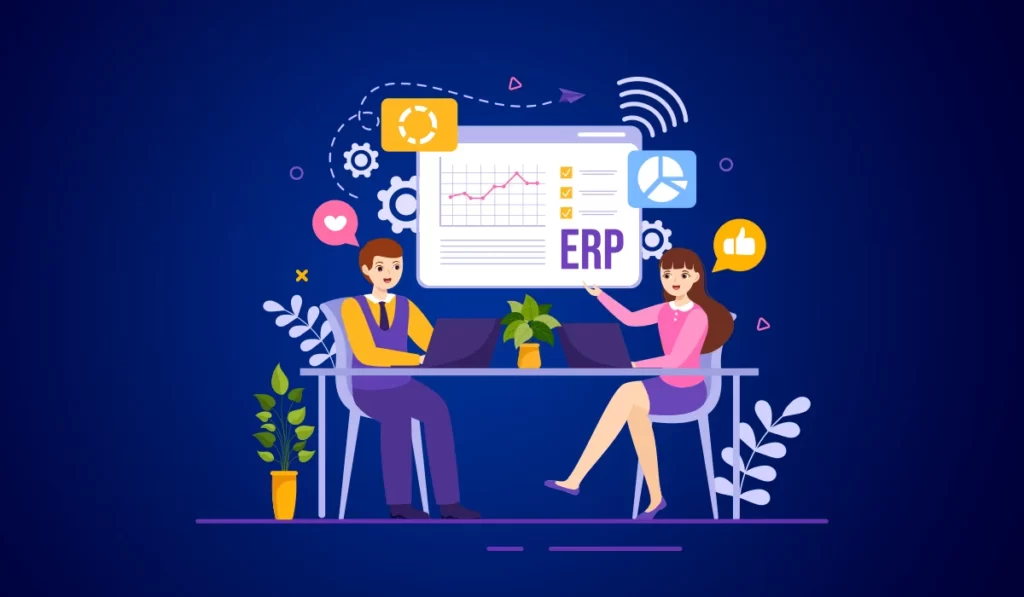Is your business struggling to keep up with the demands of an ever-changing marketplace?

The Future of Queue Management Systems

Is your business struggling to keep up with the demands of an ever-changing marketplace?
Staying competitive and efficient in the business world is not an easy task. But changes can be made with suitable alternatives and by implementing the appropriate choices.
ERP System is a remarkable tool that has revolutionized the way companies operate. It’s not just software; it’s a catalyst for transformation.
No matter what your objective is – improving customer service, increasing employee productivity, or streamlining stock control, ERP systems provide priceless services that can boost your company’s success.
If we look into this more deeply, there are several benefits of ERP for business.
In this blog let’s find out how Implementing an ERP System can benefit your business and propel your business to new heights.
Content Index

Improved Efficiency and Productivity are critical for any organization.
An ERP system centralizes and simplifies different corporate activities such as accounting, inventory management, and customer relations.
This offers real-time data access, effective communication, and routine task automation.
Businesses benefit from increased efficiency and production, as well as reduced manual errors, faster decision-making, and better resource utilization.
Making the right decision is the compass that guides you toward your desired destination.
Implementing an ERP (Enterprise Resource Planning) system in your business offers the key benefit of improved decision-making.
ERP systems centralize and streamline data and processes across the organization, providing accurate real-time information to key decision-makers.
This enables businesses to make informed and timely decisions, whether in inventory management, distribution, budgeting, or customer relationship management.
Another significant ERP benefit for businesses is that it can bring about significant gains such as cost reduction and resource optimization.
ERP systems reduce operating costs by increasing efficiency while decreasing the requirement for human labor by centralizing and streamlining different business operations.
They lower the possibility of resource waste by enabling improved decision-making through real-time data access.
This resource optimization process not only increases output but also makes sure that your company uses its resources more wisely, which will eventually increase profitability and market competitiveness.
Competitive advantage refers to the edge a company gains over its competitors.
When a company invests in a modern ERP system, even though it can be costly, it can provide a unique advantage.
Imagine a corporate business that uses such a system – they have real-time data and are agile.
For example, they can analyze customer trends faster, leading to better product development and quicker responses to market changes.
This sets them apart from rivals and makes them more successful.
Data accuracy and integrity are crucial benefits of ERP for business.
ERP systems centralize data, ensuring that information is consistently accurate and up-to-date, reducing the risk of errors and redundancies.
Data integrity is maintained through robust security measures, preventing unauthorized access or tampering.
This reliability in data enhances decision-making, streamlines operations, and fosters trust among stakeholders and partners, ultimately driving organizational efficiency and competitiveness.
Scalability and growth are critical components for a successful ERP (Enterprise Resource Planning) system in any business.
An ERP system must be designed to adapt and expand seamlessly as the business grows.
Scalability ensures that the system can accommodate increasing data volumes, users, and business processes without major disruptions.
It also enables the integration of new functionalities and modules to support evolving business needs.
A well-planned ERP system, with scalability at its core, not only aids in streamlining operations but also positions the business for long-term success by effectively supporting its growth and evolving requirements.
Compliance and security are significant aspects of an ERP system, ensuring that sensitive business data is protected and regulatory requirements are met.
By implementing robust security measures, ERP systems safeguard against data breaches and unauthorized access, which helps maintain the integrity of sensitive information.
Additionally, compliance features within an ERP system assist in adhering to industry-specific regulations, reducing the risk of legal consequences and fines.
Reporting tools in the ERP system play a vital role by providing real-time insights and customized reports, enabling businesses to make informed decisions and enhance transparency, further contributing to the overall compliance and security of the system.
Effective communication is essential in any business as it facilitates seamless information exchange and decision-making.
One of the major benefits of an ERP system is improved communication.
ERP provides smooth real-time communication between departments, teams, and geographically distributed locations, and integrates multi-agency operations and data in a centralized location.
This advanced communication encourages better collaboration, data sharing, and decision-making, leading to increased productivity and results.
In addition, ERP systems enable a comprehensive view of organizational performance by maintaining consistent, up-to-date information for stakeholders, which can be invaluable in planning for implementation and decision-making in supported knowledge
Loyal employees are a cornerstone of a successful business.
Employee satisfaction and engagement with ERP systems can improve productivity, efficiency, and overall organizational success.
Employees who are satisfied and happy with their work environment are more motivated, creative, and committed to their roles.
This positive factor can lead to increased productivity, reduced workload, better performance in the organization, ultimately improved effectiveness of ERP systems, and increased efficiency of implementation.
Customization and flexibility are other notable benefits of using enterprise systems.
They enable firms to customize the software to their own needs and processes, making it an effective tool for streamlining operations and enhancing productivity.
Businesses can tailor the ERP system to their own needs and ensure that it completely fits with their operations by customizing modules, workflows, and reports.
Flexibility not only increases productivity but also allows businesses to adjust rapidly to changing market conditions and evolving business strategies.
In this digitally competitive world of technological advancements, implementing an ERP system is no longer an option but a strategic need for any forward-thinking firm that intends to be successful.
It helps you save time, reduce data errors, and make better decisions by organizing your business without losing your goals and morals.
With all your data in one place, you can manage your business more smoothly and efficiently.
By adopting a powerful tool like ERP Solution, you’re not only investing in the software; rather, you’re investing in the future of your business.
So don’t wait! Start your ERP journey today and unlock a world of growth, profitability, and success.
If you wish to read more about ERP System in detail feel free to go through our following blogs where we have covered all aspects you need to know!
Great! What’s the single biggest challenge you’d like a software solution to solve for your business? 🎯
💡 Suggested Solution Ideas:
Just one more step! Share your details so our experts can connect with you personally and discuss tailored solutions. 🤝
Thank You for Connecting! 🎉
We've received your information and a specialist will be in touch with you very shortly to discuss how we can help your business thrive.
In the meantime, feel free to browse our resources or reach out if you have immediate questions.
Understood! 🙏
No worries if you're not exploring software solutions right now. Our door is always open if your needs change!
Feel free to explore our other offerings or connect with us anytime.